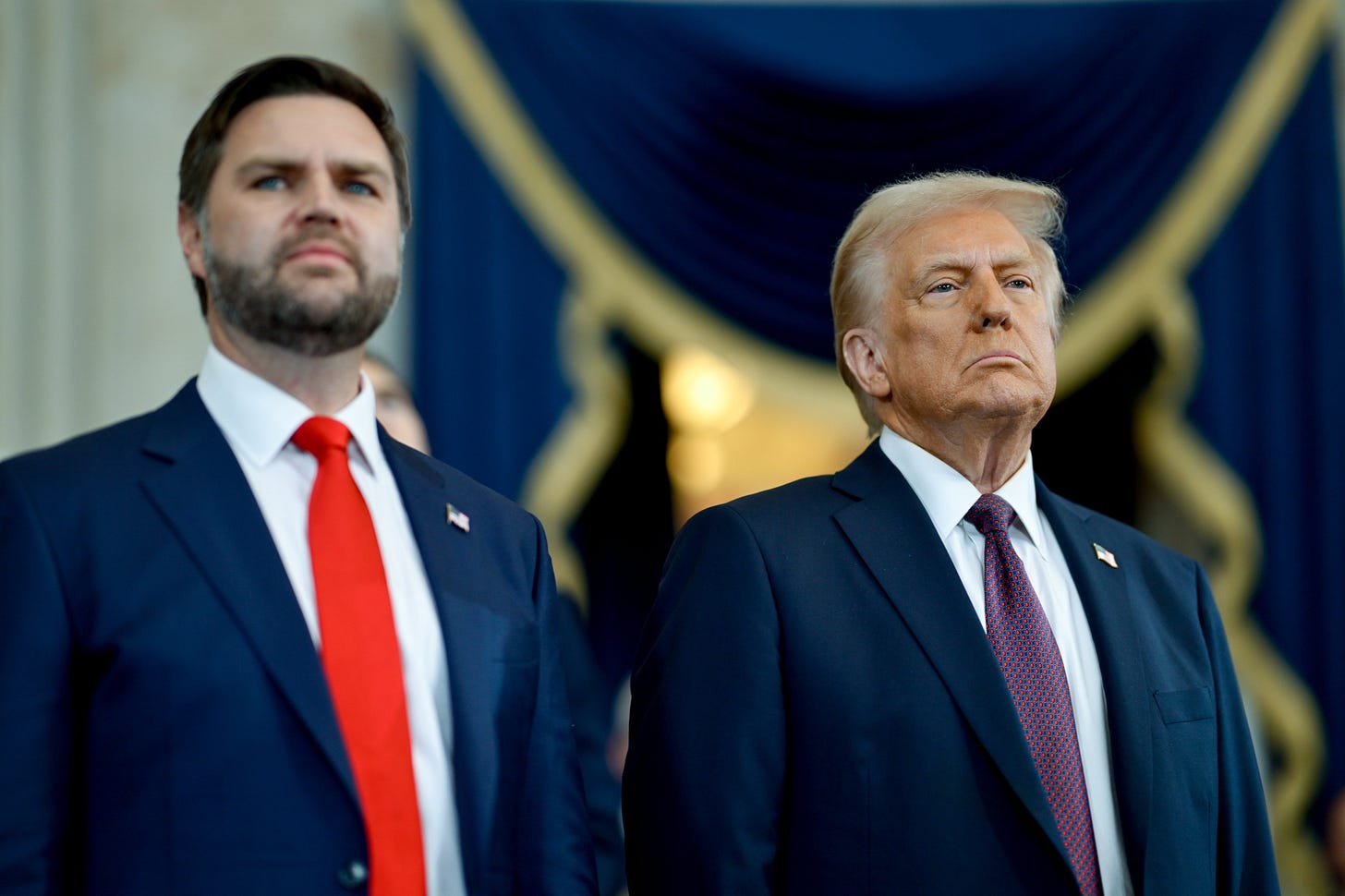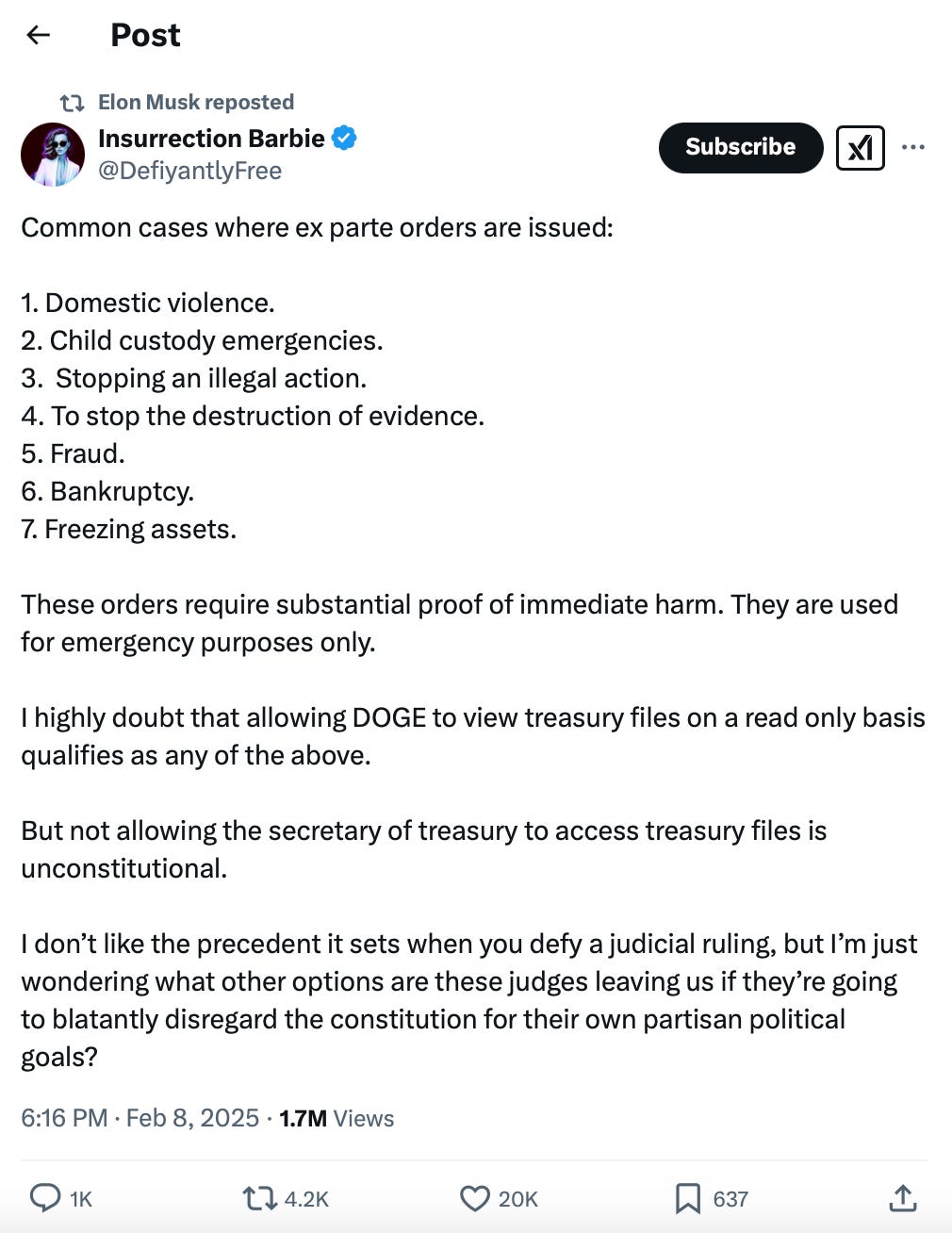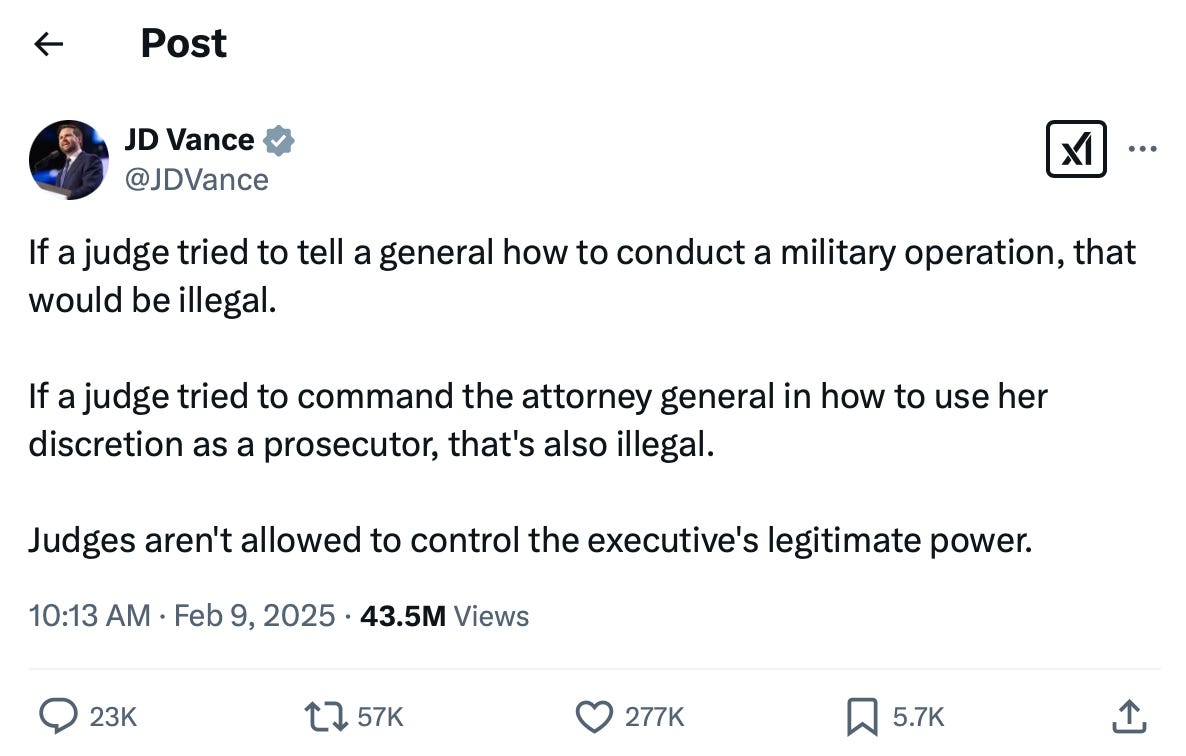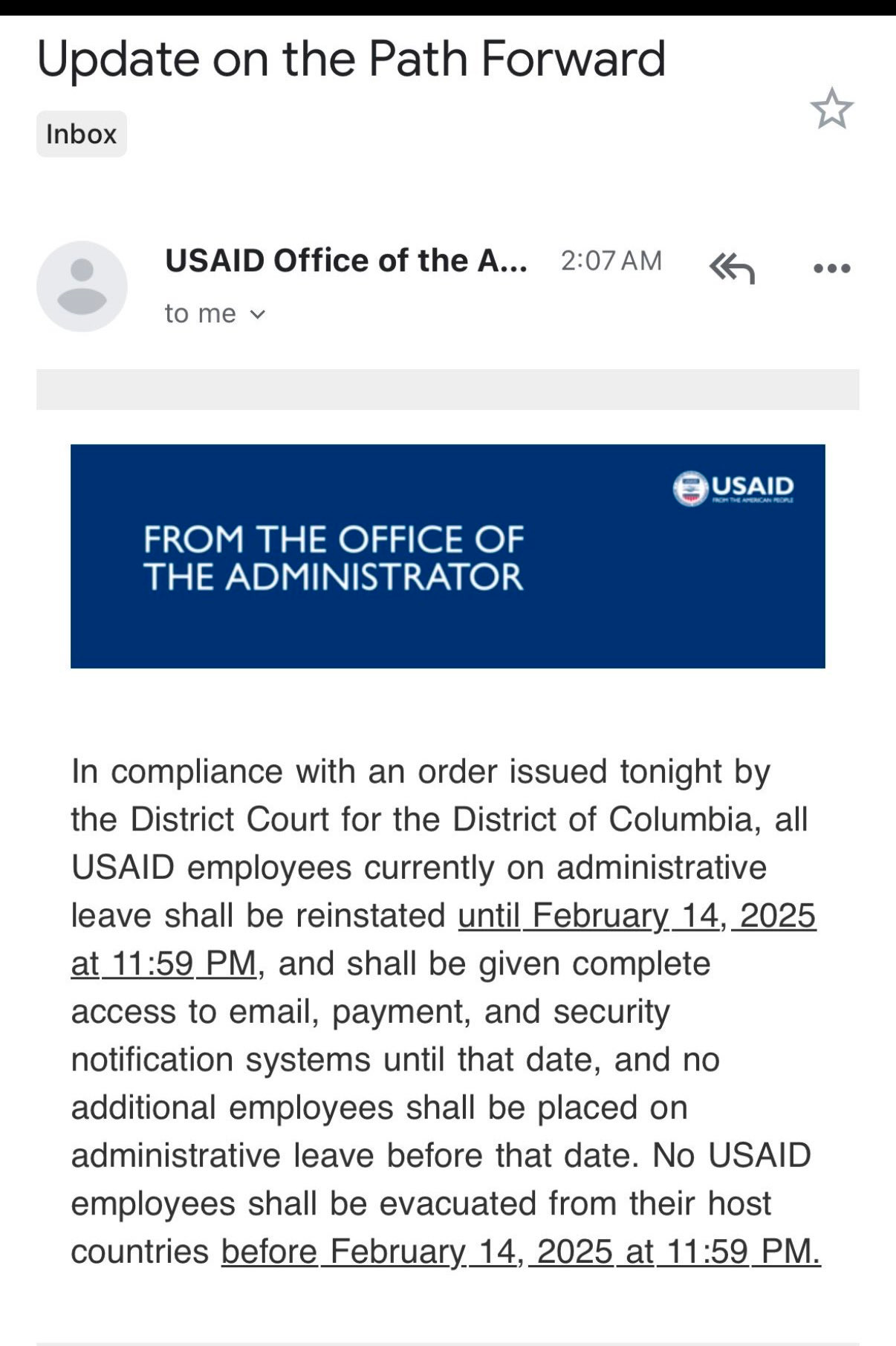Vance, Musk Lay Groundwork for Ignoring Courts
Does that mean a constitutional crisis has now arrived?
By my count, the Trump administration’s legal scoreboard stands at 3-11 as we head into the fourth week of the president’s second term:
✅ Three wins
Judges have sided with the administration on granting Elon Musk’s Department of Government Efficiency (DOGE) access to Labor Department data; on allowing a government-wide email system to be set up; and on rejecting a migrant’s request for asylum after her appointment through the CBP One app was canceled.
❌ Eleven losses
Judges have temporarily blocked the administration from limiting birthright citizenship (x3); freezing federal grants and loans (x2); granting DOGE access to Treasury Department data; offering a buyout to government employees; transferring transgender female inmates to men’s prisons (x2); sending Venezuelan migrants to Guantánamo Bay; and placing nearly the entire U.S. Agency for International Development (USAID) workforce on leave.
Notably, the judges who have ruled against the Trump administration represent appointees of six administrations (Reagan, Clinton, Bush II, Obama, Trump, Biden), led by presidents of both parties.
Judges have yet to make initial decisions in a slew of other cases, including challenges against Trump’s removal of employment protections for civil service workers; his ban on transgender service members and gender-affirming care for minors; many of his immigration actions; several moves related to diversity, equity, and inclusion (DEI); and the legality of DOGE itself.
Two cases — on the FBI’s attempt to compile a list of agents who worked on January 6th investigations and a separate case on DOGE access to Treasury Department data — have yielded joint agreements between Trump officials and the relevant challengers.
Don’t forget: All of these outcomes are provisional. These cases are at the very beginning of the legal process; no administration actions have been overturned. Judges have only issued Temporary Restraining Orders (TROs) preventing the actions from being carried out; as the name suggests, those orders only last for a limited amount of time as the cases continue through the courts.
That hasn’t stopped Trump’s closest allies from loudly protesting the court orders — and even appearing to lay the groundwork for ignoring them entirely.
It started, as it so often seems to do in this administration, with efficiency czar Elon Musk, who reposted a missive on X alleging that Judge Paul Engelmayer’s TRO preventing DOGE from accessing the Treasury Department’s payment and data systems would extend to include even Treasury Secretary Scott Bessent.
“Not allowing the secretary of treasury to access treasury files is unconstitutional,” the post shared by Musk read.
We’ll circle back to whether Engelmayer’s order actually did that in a moment, but for now, I want to focus on the next line of the post shared by one of the president’s closest advisers: “I don’t like the precedent it sets when you defy a judicial ruling, but I’m just wondering what other options are these judges leaving us if they’re going to blatantly disregard the constitution for their own partisan political goals?”
Musk reposted that at around 1 a.m. on Sunday morning. A few hours later, Vice President JD Vance shared a different post, this one by Harvard Law professor Adrian Vermeule. “Judicial interference with legitimate acts of state, especially the internal functioning of a co-equal branch, is a violation of the separation of powers,” Vermeule had written.
A little after 10 a.m. on Sunday, Vance issued a of post of his own:
Vance’s post is somewhat confusing. Sure, I suppose judges aren’t “allowed” to constrain the executive’s “legitimate power,” in the same way that a judge isn’t “allowed” to lock you up for speeding if you weren’t driving above the speed limit.
But let’s say there’s a disagreement between you and a police officer about how fast you were driving. It isn’t up to the driver to decide whether they were or weren’t going at the right speed. Ultimately, that’s up to the courts, just as the executive branch isn’t the one that gets to decide which uses of executive power are “legitimate.”
Even Vance’s examples fall flat. The courts are generally highly averse to ruling against the military — but if a general was carrying out a military operation in an unconstitutional way, they could absolutely be court-martialed, and the eventual ruling could be appealed from the military courts up to the Supreme Court (“The lawfulness of an order is a question of law to be determined by the military judge,” the Manual for Courts-Martial states quite clearly.)
Even more directly, if a judge determines that a prosecutor has brought a case with insufficient evidence, the judge can dismiss the case before a trial. It is not “illegal” for judges to rule on whether the Justice Department has correctly used its prosecutorial discretion; it is their job.
Vance’s post did not — as Musk’s repost did — contemplate subverting judicial decisions. But declaring that certain judicial constraints on executive power would be “illegal” is an obvious gateway to suggesting that the executive, in those circumstances, would be within its right to ignore a judge’s directive.
In the past, Vance himself has taken that next leap in logic.
“I think that what Trump should, like, if I was giving him one piece of advice, fire every single mid-level bureaucrat, every civil servant in the administrative state," Vance said in a 2021 podcast, when he was running for Senate. “Replace them with our people. And when the courts — because you will get taken to court — and when the courts stop you, stand before the country like Andrew Jackson did and say, ‘The chief justice has made his ruling. Now let him enforce it.’” (Jackson supposedly said that after an 1832 decision on tribal sovereignty.)
Asked about those comments in a February 2024 interview on ABC News — just months away from being tapped for the vice presidency — Vance similarly suggested that the president could ignore a Supreme Court decision if the ruling represented an “illegitimate” curb of the president’s powers.
Meanwhile, back in the present day, Musk spent the rest of Sunday calling for Judge Engelmayer to be impeached and proposing that “the worst 1% of appointed judges, as determined by elected bodies, be fired every year.” When Vance sent his tweet about “illegal” judicial rulings, Musk reposted it, appending two American flag emojis in approval.
Trump himself has not responded to Vance’s comments. When a reporter asked him about them on Air Force One on Sunday, Trump replied, “I don’t know even what you’re talking about,” before going on to mock the reporter’s news outlet.
Last week, I wrote that the U.S. will be a in a constitutional crisis if the Trump administration begins ignoring judicial rulings. That leads to the natural question: do these comments from two of Trump’s closest confidants signal that we’ve reached that point?
My answer remains “no,” because of the stark differences between how Musk and Vance have responded to unfavorable court rulings online and how the administration has actually responded to those rulings in the courts. Despite its aggressive Twitter statements, the Trump administration is continuing to comply with the flurry of judicial orders blocking their more ambitious actions.
I offered one documentary example last week; here’s another, via Sam Stein of the Bulwark: an email ordering USAID employees back to work, after a judge blocked Trump’s attempt to place them on administrative leave. The email begins: “In compliance with an order issued tonight by the District Court for the District of Columbia…”
To be clear, there is one prominent example of Trump allegedly not complying with a court order: a group of 22 states have accused the administration of flouting the order blocking the funding freeze by continuing to block grants under the Biden-era infrastructure package and Inflation Reduction Act.
But that case, too, is proceeding just as it should: the administration tried to do something. The courts blocked it. The challengers alleged that the administration wasn’t complying. And, last night, the administration responded in a court filing, writing that officials have “worked diligently to assure compliance” and arguing that the grants at issue did not fall under the court’s order. Now, it will go back to the judge to decide who is correct.
“Defendants respectfully submit that the actions described below do not run afoul of the Court’s injunction, or at least not a ‘clear and unambiguous command’ in the Court’s injunction,” the Justice Department wrote, adding: “To the extent the Court concludes otherwise, Defendants have no objection to the Court clarifying the intended scope of its temporary restraining order.”
That polite language is a far cry from the aggressive rhetoric being emitted via X by Musk and Vance.
Notably, the same is true in the very case that Musk’s complaint arose from: Judge Paul Engelmayer’s order blocking DOGE officials from receiving access to the Treasury Department’s payment and data systems.
As I noted earlier, Musk has alleged that Engelmayer’s order would prevent even Treasury Secretary Scott Bessent from accessing the systems.
Admittedly, the order’s exact language is a bit confusing. Engelmayer wrote that the defendants in the case would not be allowed to give access to the systems to “all political appointees, special government employees, and government employees detailed from an agency outside the Treasury Department.”
Bessent (along with Trump) is a defendant in the case, and the order doesn’t prevent access to the defendants, so I would say that the order fairly clearly does not constrain Bessent himself, as Musk alleged.
But could it apply to other high-ranking political appointees, like the Deputy Treasury Secretary (once one is confirmed)? That depends on whether you read the order as blocking access to:
Political appointees
Special government employees
And government employees detailed from other agencies
Or
Political appointees detailed from other agencies
Special government employees detailed from other agencies
And government employees detailed from other agencies
The first reading would block officials as high up as the Deputy Treasury Secretary. The second reading would not. I do think you could make an argument for either reading.
But, luckily, even though Musk’s repost complained that the ruling left few “other options” besides sparking a constitutional crisis by ignoring it, the lawyers at the Justice Department — smart cookies that they are — were able to think of another option. They simply filed a motion last night asking for clarification.
“On its face, the Order could be read to cover all political leadership within Treasury—including even Secretary Bessent,” the Justice Department wrote. “This is a remarkable intrusion on the Executive Branch that is in direct conflict with Article II of the Constitution, and the unitary structure it provides.”
“To be clear,” the lawyers added, “notwithstanding the Order’s defects, Defendants are in compliance with it. As described below, Defendants have taken what they believe to be all necessary steps to comply with the Court’s Order. But this is not a durable status quo. To remedy the serious problems beget by the Order’s breadth, the Court should immediately dissolve, clarify, or modify the Order while this matter is being briefed, argued, and decided on the merits.”
Again, this is exactly how the process should play out. It also isn’t terribly surprising. After all, Musk and Vance on one hand, and the Justice Department on the other, are performing for different audiences.
Musk and Vance are playing to their base, trying to show strength and getting their supporters excited by the possibility that judicial rulings might be ignored. But the Justice Department is performing for the judges, and they know that the best tack in the courts is to do the exact opposite: to politely ask for the judges to reverse or clarify their rulings, and hope that they will do so. Brazen threats of non-compliance rarely help one’s case in a courtroom.
Most importantly, the Justice Department language signals that — no matter what Musk and Vance say — the administration has not chosen to cross the constitutional Rubicon of ignoring judicial rulings (or, at least, if they have, the DOJ hasn’t been informed).
If the administration was planning to ignore the courts, there would be very little reason to even draft responsive court filings. But, as long as the administration is playing by the rules, the DOJ has every incentive to remain as polite as possible in its filings, in hope of finding success within the legal process rather than outside of it.
That means, at least for now, Musk and Vance’s rhetoric remains just that: rhetoric. As long as it continues to be unmatched by the administration’s substantive actions (both in complying with the rulings and using the normal appeals process to challenge the rulings instead of ignoring them), the threat of a constitutional crisis — by my previously stated definition — may have grown this weekend, but one has yet to materialize.
I will continue to track this story closely in the days and weeks ahead. I’m proud to have been a a small step ahead on this one, writing on February 5: “The first two weeks of Trump’s presidency have been the ‘you can just do things’ chapter, as Congress willingly handed over its power to the executive. But the ‘you can’t just do things’ phase may be coming next, courtesy of the third, oft-neglected branch of government.”
“Attention is about to shift to the judicial arena,” I wrote then, particularly focusing on “arbitrary and capricious” challenges. In the next few days, more than a few outlets joined me:
“This time, the anti-Trump resistance is in the courts, not in the streets” (Washington Post, February 6)
“Trump’s executive actions are getting challenged as ‘arbitrary.’ What does that mean?” (NPR, February 8)
“Why Federal Courts May Be the Last Bulwark Against Trump” (New York Times, February 9)
“Trump’s Rush to Unleash Executive Power Hits a Judicial Wall” (February 9, Bloomberg)
“As Trump steamrolls Washington, courts flex their power to slow him down” (February 9, Politico)
If you enjoy reading the news four days ahead of time, I hope you’ll consider upgrading to a paid subscription, to support my work to fill you in on all the news coming out of the Trump administration — hopefully ahead of the curve of other outlets.







Thanks Gabe for continuing to provide an 'adult' analysis of what is going on. No whining, no hand wringing, just well researched commentaire on the impact and possible, even probable consequences of events!
You are not often fun to read but you are definitely a must read!
Thanks!
Could you not call musk an “efficiency czar”? America doesn’t have czars. Let’s not lend legitimacy to what is purely an ego driven word.
Two, there’s nothing efficient about his actions. He is deliberately ransacking government wide data. Please describe him as what he is - a South African Nazi. Or - trump’s pet. Or - the head of the bogus department known as DOGE.
Words matter.